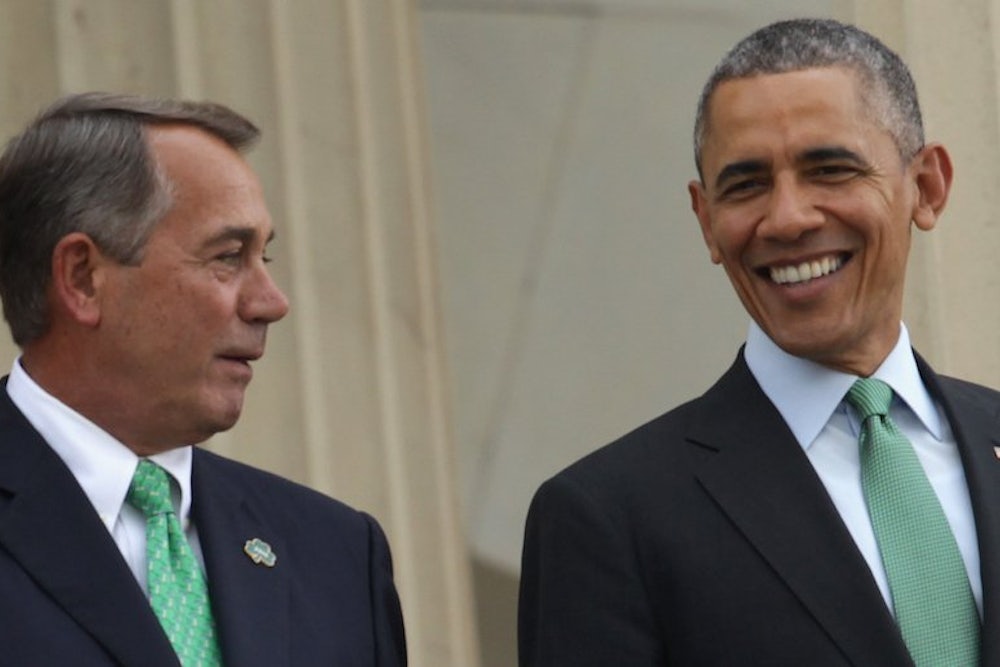Three months ago, almost nothing would’ve struck me as less likely than House Speaker John Boehner brokering a hundred-billion dollar deal with Democrats of any kind, let alone one to smooth the functioning of the U.S. health care system. And yet here we are.
It’s largely escaped notice, because it doesn’t entail shuttering any federal agencies or detonating a Strangelovean doomsday device, but if it comes to pass it’ll amount to the most important reform to U.S. health policy since the Affordable Care Act of 2010. And with fortuitous timing, it will test a new template for Congressional action in the twilight of Barack Obama’s presidency, just as Republicans drive toward another crisis.
The specific deal Boehner’s contemplating would address an issue that arises every year because the government’s formula for paying Medicare physicians generates significant annual reimbursement reductions, and every year Congress acts to prevent those cuts, to the tune of billions of dollars. It’s a recurring headache. And if Boehner is able to fix the formula, it’ll only be because he stepped out of character to negotiate a deal with Democrats before conservatives could hijack the process and steer it toward the cliff.
The value of this development thus lies as much in the specifics as in the proof of concept. According to reports, it would eliminate the doc fix problem, reauthorize CHIP for two years, and partially offset the costs by increasing cost-sharing requirements for wealthier Medicare beneficiaries. But if Boehner succeeds, he will have rolled the right without consequence and without having to resort to embarrassing maneuvers like this.
That’s a valuable precedent. You can’t transpose the politics of Medicare minutiae on to other core functions of the legislature, but Boehner should give it a shot in the coming weeks anyhow, because Republicans are drifting in the direction of a protracted, damaging budget fight that will end with a government shutdown or a humiliating cave to Democrats before the end of the year, if he doesn’t intercede. The same basic, cooperative model worked pretty well after the shutdown in 2013, when congressman Paul Ryan and senator Patty Murray reached a two year budget agreement. There’s no reason not to run the same play again.
The shutdown threat arises in large part because, though Republicans nominally control the Senate, they remain largely unable to clear partisan legislation, and entirely unable to override President Obama’s veto. Republicans helm the budget process, but the kinds of government spending bills that can pass and become law don’t look much different now than they did two years ago. Without a Democrat like Murray to keep negotiations anchored in reality, Republicans are poised for a big fight amongst themselves over budget priorities that probably can’t become law anyhow. And the risk is that in compromising with themselves, Republicans will become wedded to a consensus that they can’t force on Democrats, and thus invite a shutdown.
The dynamic is already unfolding in slow motion. House Republicans unveiled a familiar budget resolution this week, which both aspires to vast entitlement reform, but also calls for real annual spending levels that Democrats will never accept: a big cut to domestic spending with a comparably large plus-up for the defense budget.
Senate Republicans have a much weaker appetite for making gauzy, politically damaging statements about Medicare and Medicaid, but will introduce a budget of their own in the next several days, reflecting similar spending priorities. This is where the process runs off the rails.
Were Republicans inclined to deal directly with Democrats, they would involve them in the budgeting process sooner rather than later. Instead, House Republicans and Senate Republicans are set to argue with each other over details, to reach a unified budget agreement. Without an agreement, appropriators will lack toplines for government funding bills, and committee chairs will lack special instructions to write tax and spending bills. The latter point is key, because rank-and-file conservative expect Republican leaders to use the budget process to fast track “reconciliation” legislation to repeal the Affordable Care Act. This is a cardinal demand. It means Republican leaders will be under immense pressure to unify their budgets. And since budget resolutions, like reconciliation bills, can’t be filibustered, conservatives will expect them to write Democrats out of the process.
But in appeasing these conservatives, leaders will also be setting Republican appropriators on a glide path to passing government funding bills that can’t become law. Those bills, by contrast, can be filibustered. Democrats won’t support big cuts to domestic programs. President Obama won’t support appropriations that create a kind of disparity between defense and domestic spending. Increasing defense spending? Gotta increase domestic spending, too. Easing defense sequestration? Domestic programs must get the same treatment. If Republicans don’t acknowledge that reality, and eventually surrender to it, then the government will shut down in October, again.
That’s where a newly bipartisan-curious Boehner could step in to save his members from self-destruction. House Republicans can pass their budget. Senate Republicans might even follow suit. But at that point, Boehner should cut the right wing loose, just like he’s done to protect Medicare doctors. Come to an agreement with Democrats, just like Paul Ryan did with Patty Murray, that sets defense and domestic spending at levels that big segments of both parties can agree with, and let it pass. In return Republicans can keep the reconciliation instructions they’ll need (or secure an equivalent agreement) to get other priorities—including Obamacare repeal—past Democratic filibusters. Obama will veto those bills, leaving Democrats harmless, but Republicans will remain fully empowered to make whatever statements of principle and vision they want to make. And the upshot is that Republicans sidestep a government shutdown fight that would yield almost nothing of value even under the best of circumstances. After all, if Republicans keep a lid on things now, and win the White House next year, they can cut domestic discretionary spending as low as they’d like in 2017.
